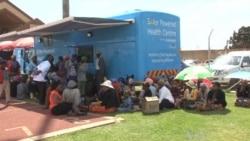MOKOPANE, SOUTH AFRICA —
Rural South Africa's lack of healthcare facilities is so significatn, many locals are forced to walk kilometers to reach the nearest clinic.
But new solar-powered mobile clinics are changing that.
At one portable clinic, women have been standing outside the seven-meter-long trailer since the early mornign hours, patiently waiting to register for ree tests and check ups.
In a mother-and-baby unit, women can learn their pregnancy status or have ultrasounds along with diabetes and blood pressure tests.
Today Dr. Nchaupe Mathosa, a member of a partnering NGO, is volunteering.
"Most people travel for miles to the clinics or looking for assistance, so, basically, once you bring a unit like this toward the rural people or the people who are in need, it would be very important to have it close-by," says Mathosa.
Funded by South Korean manufacturer Samsung Electronics, the four solar-powered mobile clinics are each specialized for health needs such as eye care, dental care or malaria testing.
The solar panels, combined with batteries, allow the trucks to operate 24 hours a day — in theory.
"In some instances, you have a clinic which is well run by an NGO, but they lack these kind of specialized services," said Kea Modimoeng, Samsung Africa's corporate citizenship manage. " We then bring in the trucks to give it as an add-on service, which is very integral to the healthcare provision."
The company partners with various aid groups, universities and local governments to strategically position the trucks. But still in its infancy, the projects remains susceptible to errors of miscommunication. Today, for example, neither Samsung nor a partnering NGO brought medical gloves or stethoscopes.
"The unit is quite good. It's got a lot of things. It's got solar… but some of the basic things like gloves, working material was not actually readily available," said Mathosa.
For Annah Mushwena, however, the wait well worth her time. Though she went to the clinic to find out her pregnancy status, she also got tested for diabetes, which, prior to arrving, she knew little about.
"I just heard about it," she said. "But to be honest, the details — how does it work, how [do I] prevent it — I was not even sure about it. But as from today, I can even explain to you how it works."
The project will be fully launched at the beginning of next year with two trucks touring South Africa and others visiting countries across Africa.
Samsung hopes to reach one million people in the rural parts of Africa by 2015.
But new solar-powered mobile clinics are changing that.
At one portable clinic, women have been standing outside the seven-meter-long trailer since the early mornign hours, patiently waiting to register for ree tests and check ups.
In a mother-and-baby unit, women can learn their pregnancy status or have ultrasounds along with diabetes and blood pressure tests.
Today Dr. Nchaupe Mathosa, a member of a partnering NGO, is volunteering.
"Most people travel for miles to the clinics or looking for assistance, so, basically, once you bring a unit like this toward the rural people or the people who are in need, it would be very important to have it close-by," says Mathosa.
Funded by South Korean manufacturer Samsung Electronics, the four solar-powered mobile clinics are each specialized for health needs such as eye care, dental care or malaria testing.
The solar panels, combined with batteries, allow the trucks to operate 24 hours a day — in theory.
"In some instances, you have a clinic which is well run by an NGO, but they lack these kind of specialized services," said Kea Modimoeng, Samsung Africa's corporate citizenship manage. " We then bring in the trucks to give it as an add-on service, which is very integral to the healthcare provision."
The company partners with various aid groups, universities and local governments to strategically position the trucks. But still in its infancy, the projects remains susceptible to errors of miscommunication. Today, for example, neither Samsung nor a partnering NGO brought medical gloves or stethoscopes.
"The unit is quite good. It's got a lot of things. It's got solar… but some of the basic things like gloves, working material was not actually readily available," said Mathosa.
For Annah Mushwena, however, the wait well worth her time. Though she went to the clinic to find out her pregnancy status, she also got tested for diabetes, which, prior to arrving, she knew little about.
"I just heard about it," she said. "But to be honest, the details — how does it work, how [do I] prevent it — I was not even sure about it. But as from today, I can even explain to you how it works."
The project will be fully launched at the beginning of next year with two trucks touring South Africa and others visiting countries across Africa.
Samsung hopes to reach one million people in the rural parts of Africa by 2015.






